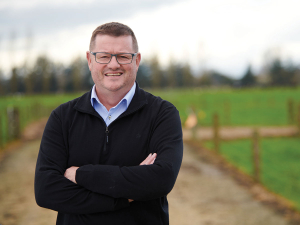Rural bias?
OPINION: After years of ever-worsening results from our education system, the startling results from a maths acceleration programme stood out like a dog’s proverbials – the trial producing gains of one full year in just 12-weeks.
 DairyNZ chief executive Campbell Parker says science is pivotal to driving progress and unlocking opportunity and innovation in the ag sector.
DairyNZ chief executive Campbell Parker says science is pivotal to driving progress and unlocking opportunity and innovation in the ag sector.
Science is pivotal to driving progress and unlocking opportunity and innovation in the ag sector, says DairyNZ chief executive and chair of the Agribusiness in Schools programme, Campbell Parker.
DairyNZ, along with the Ministry of Education (MoE), NZ Qualifications Authority (NZQA) and various primary industry groups have set up an academic programme in 125 secondary schools to teach agriculture, horticulture and agribusiness.
Parker, who has spent more than 30 years in the ag sector, spoke to DairyNZ in the wake of an abortive attempt recently by the MoE to remove agriculture as a standalone academic subject and drop it to a lower ‘vocational’ level. This move drew unprecedented outrage from ag teachers, industry leaders and the Agribusiness in Schools itself.
Following the backlash, Pauline Cleaver MoE’s deputy secretary, curriculum centre, issued a statement stating that agricultural and horticultural science will remain a standalone, Ministry-led subject for Years 12 and 13.
“Agricultural and Horticultural Science plays a key role in preparing students for careers in one of New Zealand’s most significant economic sectors. The food and fibre sector employs around 14% of the national workforce and contributes substantially to the country’s economic performance.
“I’ve also confirmed that agribusiness will remain integrated within Business Studies at Years 12 and 13. The Ministry will work closely with subject associations to ensure agribusiness is clearly visible, explicitly recognised, and valued within the subject.”
He says the fact that decision got overturned in a few days speaks volumes for how strong that voice was and the collective view of what the primary sector needs. Parker says it was pleasing to see how swiftly Education Minister Erica Stanford acted to restore the programme.
Parker believes the MoE misunderstood how important it was to have agricultural subjects taught at an academic level and he says the goal is always to work with the Ministry rather than have a confrontational approach. He says industry has a part to play and making sure that decision makers in Wellington fully understand the value of fostering agri subjects at an academic level.
“We need some of the brightest and best young people who want to go on to careers in the sector to go from secondary school through to university,” he says.
“Science has always played a big part in dairy. If you look back to 1923 when the Dairy Board was formed, farmers have invested a levy into research and science for over 100 years. Some of those early innovations turn up in tools on a cow shed wall today - for example, a spring rotation planner came from science,” he says.
One of the critical aspects of science, says Parker, is that it provides hard evidence on which decisions can be made. He says everyone has opinions, but he says in the end, scientific evidence will win over opinions.
The Crocodile Pit
To foster and spark innovation in schools, what is known as the ‘crocodile pit’ is run annually.
This could loosely be compared to the TV show The Dragons Den, but it is where students are given the opportunity to come up with some unique innovations that could be applied in agriculture and pitch these to a judging panel. Campbell Parker describes it as one of the most inspiring days of the year.
“This is because you get young kids trying to come up with ideas that will help the sector continue to move forward. What I would say is that some of those kids are from urban families and what they get from that programme is that it ignites their passion in the sector and maybe leads them on a career path in agriculture,” he says.
The Agribusiness in Schools programme is about informing young people about the great career options in the primary sector. He says they not only have success in rural schools but also in some cities such as Auckland.
Coming in at a year-end total at 3088 units, a rise of around 10% over the 2806 total for 2024, the signs are that the New Zealand farm machinery industry is turning the corner after a difficult couple of years.
New Zealand's animal health industry has a new tool addressing a long-standing sustainability issue.
The Government has announced that ACC will be a sponsor of this year's FMG Young Farmer of the Year competition.
As veterinary student numbers grow to help address New Zealand's national workforce shortge, Massey University's School of Veterinary Science is inviting more veterinary practices to partner in training the next generation of vets.
South Island dairy farmers will soon be able to supply organic milk to Fonterra.
Norwood has announced the opening of a new Tasman dealership at Richmond near Nelson next month.
OPINION: There will be no cows at Europe's largest agricultural show in Paris this year for the first time ever…
OPINION: Canterbury grows most of the country's wheat, barley and oat crops. But persistently low wheat prices, coupled with a…